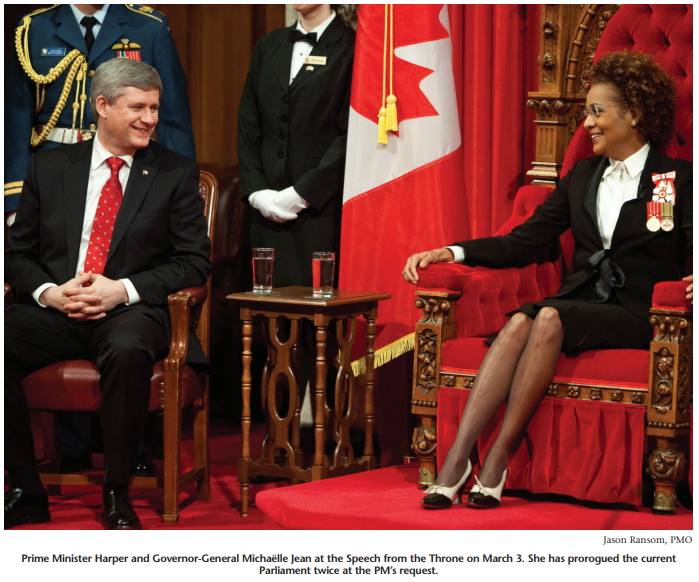
Recent years have seen the confluence of three well-documented factors in Canadian politics: a succession of minority Parliaments, a related heightening of the profile of the governor general and, partially tied to these developments, the accelerated concentration of power within government in the Prime Minister’s Office (PMO). The interplay between these forces reached a controversial zenith with the parliamentary crisis of 2008, which of course led to a prorogation, and again — if less spectacularly — to a prorogation of Parliament a year later. These events underscore the unsettling degree to which Canada’s version of the Westminster system has come under pressure in the post-Chrétien era. Our suggestions for remedies are, first, that the pressure might be eased by modifying the selection process for the office of the governor general so as to recover traditional and valuable prerogatives that, given recent precedents, may be in danger of falling into abeyance; and, second, that we can look to the current government’s legislative approach to Senate reform for clues to how such a restorative modification could be achieved without de jure constitutional amendment.
It is close to a truism among political scientists and policy analysts that power has become steadily concentrated in the PMO since the 1960s. On one level, of course, the successive minority Parliaments after 2004 impose serious limitations upon prime ministerial power, limitations that were absent in the more stable patterns that characterized, with occasional exceptions, the Trudeau-Mulroney-Chrétien periods. Paul Martin and Stephen Harper have not been able to take the acquiescence of Parliament for granted, as their predecessors for the most part could. Partly because of this, and because of the government’s concomitant need to run parliamentary discourse as a perpetual election campaign with all the discipline and centralized control that entails — the present era has intensified the concentration of power to an unprecedented degree. It has been commonplace for observers to remark on the comparative invisibility of the Stephen Harper cabinet (whose members have required permission even to hold interviews) and to underscore the controlling propensities of this prime minister over every facet of the government.
This is not simply a reflection of the Prime Minister’s personality, though it may also be that; the imperative of prime ministerial control becomes overwhelming when the governing party is placed (or places itself) in an essentially antagonistic relationship with a parliament that cannot be counted on to defer to the prime minister, or even to allow the government to survive.
This has led to some peculiar manoeuvring within (and perhaps beyond) the boundaries of responsible government. For instance, citing procedural issues, Paul Martin refused to accept what the opposition parties agreed was a motion of nonconfidence in May 2005. Equally disturbing has been the present government’s easy recourse to prorogation, both to escape an unambiguous nonconfidence vote and to avoid potential political damage. In December 2008, of course, confronted with an imminent vote of nonconfidence and a Liberal-NDP coalition abetted by the Bloc Québécois presenting itself to the Governor General as a credible alternative government, Prime Minister Harper convinced Her Excellency to prorogue Parliament — a tactic that, compounded by Conservative victory in the ensuing propaganda war, led to the collapse of the coalition and Stéphane Dion’s replacement as Liberal leader by Michael Ignatieff.
We can only speculate on why Michaëlle Jean granted the Prime Minister’s request in this largely unprecedented situation. She may have wished to avoid a King-Byng like crisis as part of her legacy at Rideau Hall. Perhaps, given the overarching duty of the governor general to ensure a functioning government, she viewed prorogation as a reasonable method for testing the solidity of the coalition (a test it failed). She may have been swayed by doubts about the popular legitimacy — the constitutional legitimacy being irreproachable — of a coalition led by an unpopular Liberal leader and propped up by the sovereigntist Bloc Québécois, ascending to power on the heels of an election which gave the Conservatives a stronger plurality. It is worth noting here that, while the legitimacy of what Prime Minister Harper brutally styled “the separatist coalition” would likely have been wobbly outside Quebec, regardless of PMO spin, the government’s tactics contributed to placing the office of the governor general in a political trap, exploiting the difference between responsible government and representative government, and forcing a false dichotomy in the public mind between popular democracy and democratic governance.
It is close to a truism among political scientists and policy analysts that power has become steadily concentrated in the PMO since the 1960s. On one level, of course, the successive minority Parliaments after 2004 impose serious limitations upon prime ministerial power, limitations that were absent in the more stable patterns that characterized, with occasional exceptions, the Trudeau-Mulroney-Chrétien periods.
Precedent may also have counted in the 2008 decision. No prime minister has ever been refused a request to prorogue (although Lord Byng famously did refuse Mackenzie King’s request for dissolution in 1926). The government’s public position, meanwhile, was that by convention the governor general must always defer to prime ministerial advice — a position that, prima facie, guts the office of its residual prerogative powers.
We have no way of knowing which, if any, of these arguments Her Excellency accepted, of course. Public explanation is not among her duties.
A year later, faced with a discordant House and intensifying opposition pressure over the indirect implication of Canadian officials in the torture of Afghan detainees, the government again requested a prorogation. The request was almost as extraordinary as its predecessor. It occurred, most unusually, in mid-session, and granting it meant killing 37 bills awaiting passage. Unseemly or not, the request was again granted. In the absence of credible justifications for prorogation itself, we must assume that deference to the prime minister — even at the expense of Parliament’s capacity to function as critic and overseer, let alone as the source of an alternative government — was the operative constitutional principle. (Happily, polls and protests indicated considerable distaste toward the government’s tactics; yet it may be telling of our present state of affairs that the Prime Minister and his advisers apparently expected no such backlash, and later scrambled to cancel the parliamentary breaks in the spring session “in order to make up the time lost”). Notable, also, is the sequencing of these two prorogations. While the first was, to put it most charitably, abnormal, once that standard for deference had been employed, the Prime Minister felt comfortable enough to attempt to normalize the second prorogation as a typical end-of-session phone call to the Governor General. This is significant because the 2009 prorogation, while not as dramatic as its predecessor, was (arguably) at least as problematic; a point, it turned out, that was not lost on the public at large.
There is irony in these developments. The great achievement of responsible government was to tame the monarch’s representative and compel him or her to defer to the will of Parliament — the “people’s house,” as David E. Smith reminds us — while retaining the residual prerogatives necessary to ensure that an effective government is in place. What we may now be seeing, in this era of both massive concentration of power in the prime minister’s hands and deep antagonism between the government and Parliament, is the use of the governor general for the subordination of Parliament to the will of the prime minister. In this context, the principle of deference to the prime minister perversely serves as a mechanism for neutering Parliament.
The point is not quite that the Governor General behaved inappropriately either in 2008 or 2009. The principle of deference is an important one; too assertive a governor general could be far more corrosive to our constitutional tradition than a congenitally deferential one. And as we have seen, Michaëlle Jean may have had further reasons for acting as she did in the coalition crisis. Nonetheless the PMO has emerged from these events more powerful than before. Prorogation has now been established as a permissible method of circumnavigating votes of confidence. The principle of deference and the body of precedent against the exercise of prerogative power have both grown markedly stronger.
So where should we go from here? Public resistance to the 2009 prorogation offers a heartening sign that, even if Canadians rather fail to understand responsible government as a principle, they do value the parliamentary process. Prime ministers in future may resist reproducing the Harper pattern of easy prorogation for fear of awakening this slumbering commitment. So it may yet suffice to repose our faith in the people as the ultimate defence of parliamentary tradition. But the coalition crisis suggests that it behooves us also to consider the possibility of institutional correctives.
The Liberals and the NDP have recommended procedural tweaks, whereby the House of Commons could limit the prime minister’s unilateral ability to seek prorogation at his pleasure. These are worthy, modest proposals, but such mechanisms may well fly with blind optimism into the brick wall of how power is wielded in Parliament, substituting for the visible hand of the prime minister the invisible hand of the party whips, without altering the calculus of power. Nor would such changes alter the fact that no parliament in a Westminster system can be bound by the parliament before it; Parliament can change its standing orders again — and probably with little public attention.
A more durable solution might involve the institution of the governor general itself. In a context marked by unprecedented concentration of power in the prime minister’s hands, and the ongoing corrosion of parliamentary tradition, norms and even authority, there is much to be said for a head of state who is better placed to act as what the Globe and Mail‘s Michel Valpy calls a “fire extinguisher” supporting our constitutional traditions. Achieving this requires neither a comprehensive reform of the institution, nor the constitutional headaches that go with it. The key lies with the process of appointment.
Because the governor general is appointed by the monarch on the recommendation of the prime minister, the office lacks any independent base of legitimacy beyond constitutional tradition. This, as the coalition crisis suggests, carries unnervingly little freight with the wider public, which in turn makes it easier to surrender residual prerogatives in favour of blanket deference to the prime minister. If the goal is to restore a more traditional balance between Crown and Parliament, the desired outcome is not an activist governor general but an office of sufficient moral authority as to truly serve in a manner analogous to the British monarch. British governments have diligently avoid placing the Queen a the position of making decisions that could be perceived as partisan, weak or wrong-headed. This crucial norm has become imperilled in our era of minority Parliaments.
We should begin, then, by canvassing options for changing the selection process so as to reinforce the moral authority — the “soft power” — of the governor general. There are many possibilities, but we want, in a very preliminary way, to invoke two. The first involves a legislative change to an elected office. The second follows Edward McWhinney’s The Governor General and the Prime Ministers in recommending parliamentary ratification: for example, “the House of Commons, voting by a special majority (say, two-thirds of its members).” Either change could bring desirable effects — and, crucially, could be accomplished without formal constitutional reform.
Under the 1982 Constitution Act, de jure changes relating to the monarchy require provincial unanimity and, if the precedent of 1992 is followed, possibly a national plebiscite or a series of provincial referendums. It would be lunacy for Canada to jump back into that cauldron. Fortunately, however, the Harper Conservatives’ approach to Senate reform, an equally vexed constitutional question, offers a template of considerable interest in this different context. The Conservatives have proposed legislation to establish advisory elections for new senators, meant to constrain the prime minister’s discretion in filling vacancies in the Red Chamber. These elected senators would, by a further act of legislation, be restricted to a single eight-year term. That these proposals are presently mired in a bog of constitutional problems is hardly surprising considering the Senate’s intimate connection to the balance of power between provinces and the federal government.
While there is certainly a federal dimension to the Crown, we do not anticipate comparable complications besetting a legislative proposal to change the method for selecting the governor general, as it would in no way affect the federal balance of power. And either of the above scenarios would be consistent with both the Constitution and the best gradualist traditions of Canadian nationhood and independence. They would retain, and perhaps even help to restore, the essence of the office, while further minimizing its qualities as a relic of the British Empire: a de facto Canadian head of state chosen by voters, or by the bipartisan or multi-partisan approval of parliament, but requiring no formal, difficult break with the monarchy.
Consider, briefly, an elected governor general. In the spirit of the Senate proposal, elections for the office would be technically advisory, but practically authoritative, in guiding the prime minister’s recommendation to Buckingham Palace. Legislation to this effect would need to do several things, including formalizing criteria for candidacy for the office and specifying term length (we see no obvious reason to deviate from the present norm of six years, but nothing pivotal hangs on this). Campaign financing rules and spending limits would also have to be put in place. Given the absence of explicit constitutional restrictions of the kind contained in the Irish constitution, there would be some risk of the office gradually mutating into a soi-disant presidency empowered by popular mandate and too willing to confront prime ministers (or, for that matter, Parliament itself). A requirement that candidates agree to respect the history and traditions of the office, and perhaps take a public oath to that effect, would help to mitigate this danger. Similarly, while one much-touted role of the monarch in parliamentary theory is to serve as a non-partisan point of allegiance, the prospect of elections for governor general raises the risk of explicit partisanship in the office. A formal ban on partisan involvement, akin to what is in place at the municipal level in Canada, would not eliminate involvement by individuals associated with parties, but it would offer an invaluable reinforcement of the necessary normative barriers to formal partisanship.
Designing a comprehensive legislative framework for an elected governor general thus promises to be a complex business, more complex than the Conservatives’ Senate
reform measures have been so far.
Designing a comprehensive legislative framework for an elected governor general thus promises to be a complex business, more complex than the Conservatives’ Senate reform measures have been so far. And some risks are impossible to legislate away, such as the chance of these elections landing in the primordial soup of Canada’s constitutive divisions of language, culture and region. But consider the potential gains. There is some evidence that new coalitions form across party barriers in support of municipal candidates, and something of the kind might be positively desirable in advisory elections for governor general, allowing for the coalescence and articulation of national visions and discourses outside of party straitjackets. An elected representative of the Queen would in itself mark one step in the enhanced democratization of a system often decried for its “democratic deficit.” More fundamentally, by further raising the profile and status of the office, advisory elections promise to enhance the governor general’s standing as a genuine point of allegiance for citizens. And they would certainly give the victor a platform of popular legitimacy from which to robustly uphold parliamentary tradition even in defiance of the prime minister.
The likely benefits of our second alternative — McWhinney’s proposal for parliamentary ratification — are perhaps more muted, but so are its risks. It is less radical and less redolent of an alien republicanism, and it points, as the alternative does not, directly back to the supremacy of Parliament. The requirement of an extraordinary majority for ratification perhaps poses some threat to the “non-partisan” aspect of the governor general’s job description, but also ensures that the eventual choice would be acceptable across a range of partisan lines. There are precedents for this form of selection in the choice of the Speakers of the Canadian House and Senate. These examples indicate not only that nonpartisan selection is possible, but also that when it is necessary and reinforced properly, it can create an additional, albeit minor, bonus of trust and cooperation in Parliament. And if a governor general so appointed would probably not enjoy the profile and popular legitimacy of the elected alternative, he or she would likely be better positioned in these respects than is presently the case.
The above is intended as neither a comprehensive exploration nor an arbitration of these scenarios. It is meant only to show that they merit serious discussion given the dynamics we described at the outset. Under either proposal, the governor general would be able to meet a prime minister armed both with the traditions of her office (which are, of course, not without healthy ambiguity) and with an independent legitimacy as the authoritative interpreter of the meaning of those traditions. A wise prime minister would thus have strong incentives to avoid forcing the issue of the boundaries of the authority of the office. This would help to temper any excessive recourse to devices such as prorogation and bolster the office itself against scorched-earth policies of the type deployed by Mackenzie King against Lord Byng in 1926. The result would be an outcome more consistent with our parliamentary heritage than the current drift toward prime ministerial fiat. A legislative rather than explicitly constitutional revision of the appointment process thus has the potential to be a restorative reform, helping to redress the imbalance between the prime minister and the House.
Photo: Shutterstock








